Ukraine-Russia conflict: ‘We are overwhelmed’, says Edinburgh’s Ukrainian Club as donations for refugees pour in
and live on Freeview channel 276
“We are overwhelmed,” says club member Senia Urquhart. “Last night, people just kept coming, the whole place was filled. We weren’t expecting this.”
The club has had to put out messages on social media channels asking people to make their donations in cash, rather than goods, if possible. The sheer scale of the good will of the Edinburgh population has taken them by surprise, with people turning up in a steady flow from the minute they advertised the collection point. The scene, they say, is repeated at six different donation locations run by the Ukrainian community across Scotland.
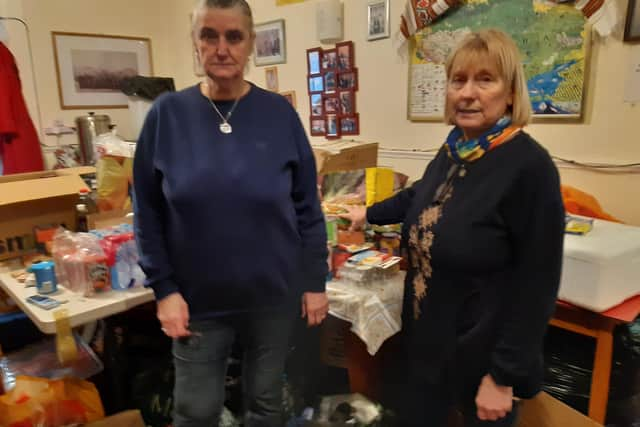

Advertisement
Hide AdAdvertisement
Hide AdWorking in shifts, the club is sorting the donations into packs, dividing up food, hygiene products and baby essentials. They are loading them into vans to initially be put in storage, until they have the green light to send convoys across to eastern Europe.
Most of the donations will be taken to countries bordering Ukraine such as Poland, Hungary and Romania. The United Nations’ refugee arm, UNHCR, said at the weekend so far, 1.5 million Ukrainians have left the country in the week since the conflict began.
Ms Urquhart breaks off to direct helpers, who are buzzing around the club, taping boxes and carrying donations up the basement steps to waiting vans.
"Pet food over there,” she tells a volunteer, pointing to an already packed corner of the room.
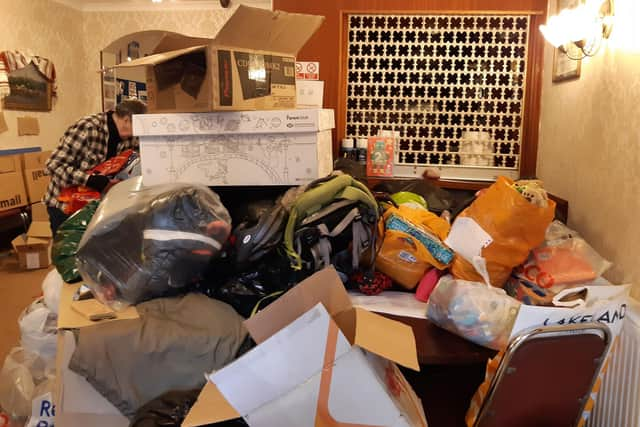

Advertisement
Hide AdAdvertisement
Hide AdThe club, founded by Ukrainians who moved to Scotland at the end of the Second World War, usually hosts cultural events and community get-togethers. However, when the first murmurings of a possible Russian invasion began weeks ago, they sprang into action.
"We have been fundraising for weeks, because we knew there might be something happening,” says Ms Urquhart. “But we had no idea that it would be like this. We are so worried. We have friends and family in Ukraine. Most of my friends are mainly in the west, where it is safer, but not completely safe.”
Ms Urquhart adds: "It is very emotional. We are very, very worried. The whole world is worried right now, but we’re just trying to focus on doing what we can from here.”
The group has been in contact with the Scottish Government to discuss the practicalities of the aid scheme.
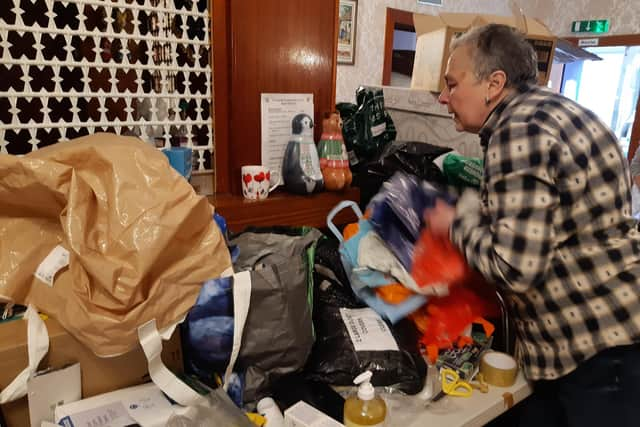

Advertisement
Hide AdAdvertisement
Hide AdAuthorities have warned financial donations are more useful on the ground than physical donations.
Ms Urquhart says: “We’ve had to ask people to try to give donations financially now, we have so much stuff.”
Ann Ostopko agrees.
She says: “None of us have experience with dealing with anything on this scale. The logistics are just beyond us.”
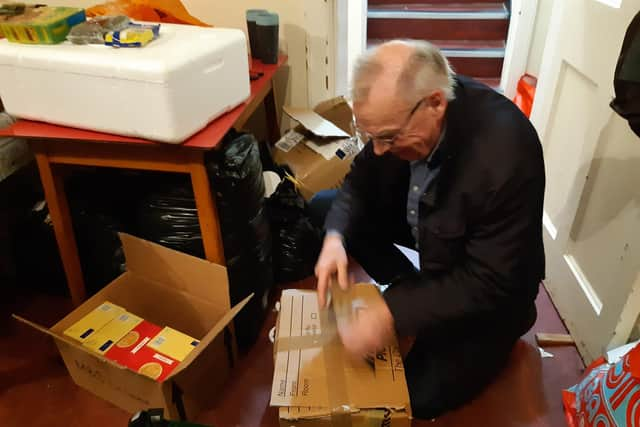

Her nephew Stephen Ostopko says: "We’ve had a lot of donations from the Russian community. Some Russians came last night and brought things and stayed to help sort everything, we couldn’t have done all of this without them.
Advertisement
Hide AdAdvertisement
Hide Ad"They even offered us their van to help transport the donations. I don’t know what they feel exactly, but I think they just wanted to help.”
One man, who has lived next door to the club for his whole life and is of Polish origin, has rallied to help his neighbours. Other Poles living in Edinburgh have offered help to transport the goods to refugees crossing the Polish border.
“I’m of Polish origins and my family has been friends with the Ukrainian community for years,” says Eddie Kopystynski. “I’m like everyone else, I just want to help.
"There have been a lot of Polish people who have come down to volunteer.”
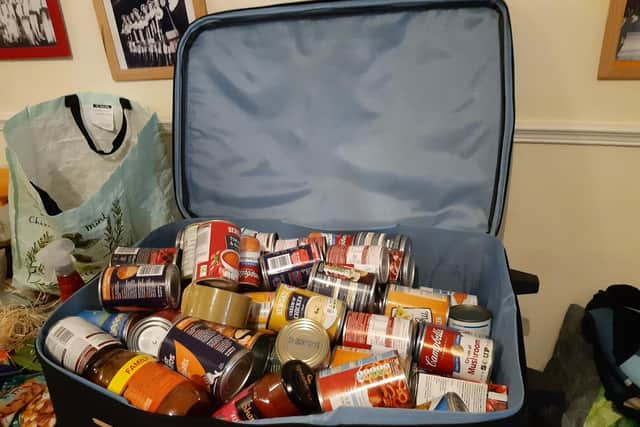

Advertisement
Hide AdAdvertisement
Hide AdClub member Terry Kowal has been tasked with working out the legal logistics of transporting vans of goods thousands of miles across Europe.
"It’s just a case of getting everything on the van and getting it out of the country," he says. “The problems may be getting it from us to the European Union now – since Brexit things have changed. It is all this kind of thing that we are trying to work out.”
He pauses from his work taping a box full of tinned food.
"I don’t think any of us could have anticipated how generous everybody has been and this is just a microcosm of what is happening across the country,” Mr Kowal adds.
Irina Shlumukova, who was born in eastern Ukraine and has only recently moved to Scotland, but has lived in the UK for 30 years, is packing goods into boxes. She has family in various regions of Ukraine, some of whom are living in major cities, which have come under heavy fire from Russian troops.
Advertisement
Hide AdAdvertisement
Hide Ad"They are still alive this morning and they are not going anywhere,” she says.
Ms Shlumukova adds: "You cannot imagine [what it is like]. I do not want you to imagine, I do not want anyone to imagine.”
The generous outpouring of donations is the same across Europe, especially in countries where refugees are fleeing. Grassroots groups have sprung up around countries bordering Ukraine to help match people who need a place to stay with available accommodation – and food.
In Moldova, which borders Ukraine to the south west, volunteers have also been inundated by public donations.
Advertisement
Hide AdAdvertisement
Hide Ad"We posted updates about current needs and told people to stop donating when it was too much,” says Alex Gurdila, who lives in the Moldovan capital Chisnau. “I tried to direct traffic of donations from one central place to the regions.
"A former colleague of mine went to the border quite a few times and brought in a few families herself, then we bought supplies like power banks and blankets for the refugees.”
A message from the Editor:
Thank you for reading this article. We're more reliant on your support than ever as the shift in consumer habits brought about by Coronavirus impacts our advertisers.
If you haven't already, please consider supporting our trusted, fact-checked journalism by taking out a digital subscription.
Comment Guidelines
National World encourages reader discussion on our stories. User feedback, insights and back-and-forth exchanges add a rich layer of context to reporting. Please review our Community Guidelines before commenting.
